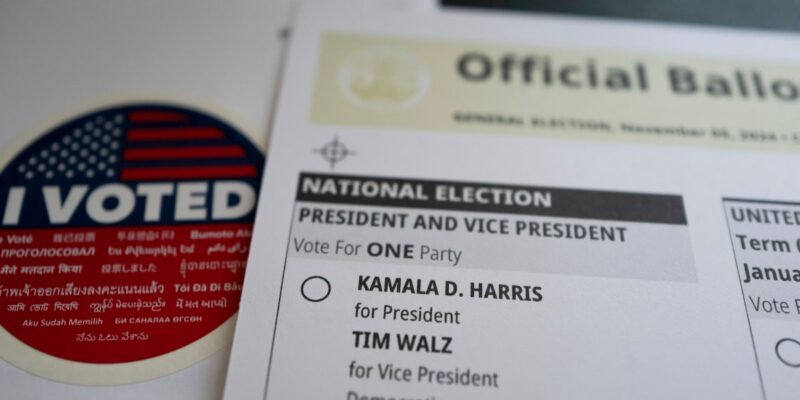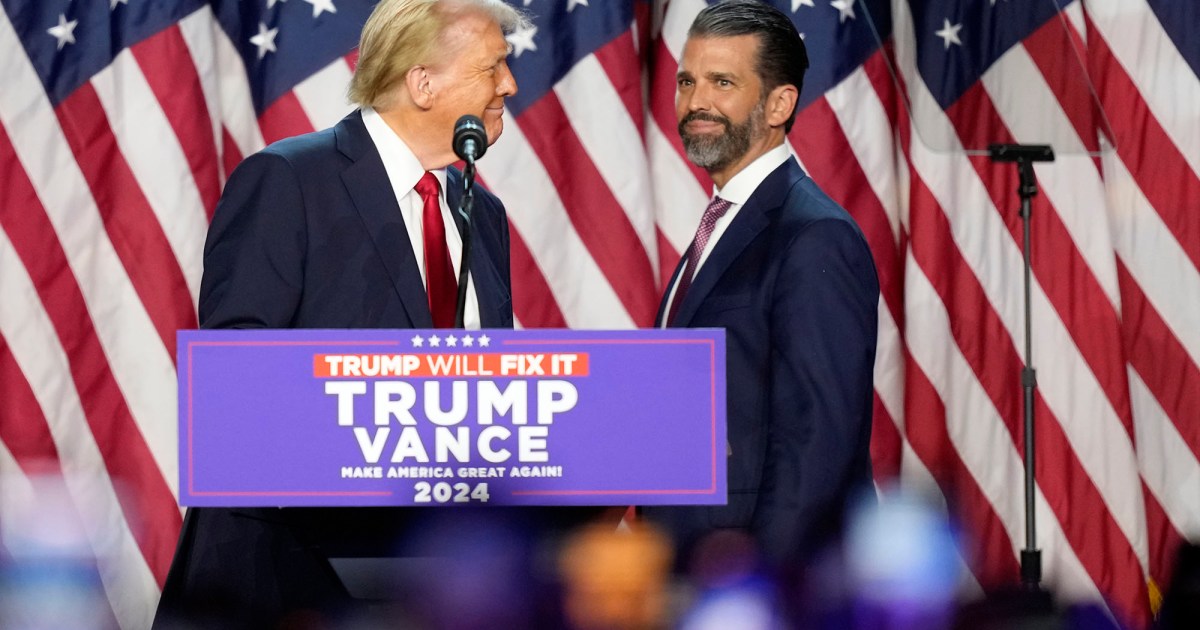
Good news, patriots! American voters have finally found something they can agree about: Their candidate is going to win in November. That’s according to a new survey by Bright Line Watch, a group of researchers who, since 2017, have been tracking the state of American democracy and potential threats to it. The survey finds some hopeful news about Americans’ faith in elections, but it also offers stark warning signs about threats to democracy that could arise if there’s a huge mismatch between voters’ expectations and the ultimate winner of the election.
The new survey asked about 2,700 people how they plan to vote in the presidential election. As with most polls, the results revealed a close race, with 46 percent of respondents saying they’d vote for Trump, while 49 percent will pull the lever for Vice President Kamala Harris. The researchers weren’t interested in only the horse race, though. They wanted to explore likely voters’ expectations for the election outcome. That’s because they have found that, as was the case in 2020, unexpected results tend to drive fraud and malfeasance around elections and mistrust in the integrity of the system.
The survey found that nearly 90 percent of both Republicans and Democrats expect their candidate to prevail in November. Sizable minorities also believe their candidate will win in a blowout. Nearly 40 percent of Republicans and more than a quarter of Democrats believe that their candidate will win by “quite a lot.” That disparity between outcomes and expectations, particularly among the most partisan media consumers, can make voters on the losing side vulnerable to the sorts of misinformation and conspiracy theories spread by Trump and his supporters’ 2020 “Stop the Steal” campaign that laid the groundwork for the January 6 insurrection at the US Capitol.
“You can absolutely imagine something similar” happening this year “especially when Trump is telling people ‘we’re going to win unless they steal it,’” says Brendan Nyhan, a Dartmouth College professor of government and a co-director of Bright Line Watch. “He’s playing into this in a way that is obviously dangerous and reckless.”
Despite similar expectations of victory among Democrats, Nyhan says it’s harder to imagine Harris supporters responding the same way MAGA devotees did in 2020. Bright Line surveys show that Democrats tend to be more accepting of election results. Plus, everyone expects Harris to concede if she loses.
Lest you think that Democrats are completely impervious to election misinformation and conspiracy theories, the Bright Line researchers are here to prove you wrong. “Polling shows Democrats are vulnerable,” Nyhan says. For instance, the Bright Line survey found that more than a third of Democratic respondents falsely believe that the assassination attempts on Trump were staged to help his election prospects.
Also recall the 2016 election, Nyhan says, when Hillary Clinton was predicted to win the presidential election. Many Democrats, he says, embraced conspiracy theories to explain Trump’s unexpected victory. Bright Line surveys show that today, Democrats still falsely believe in fairly high numbers—more than 50 percent of those polled—that Russia changed actual votes to swing the 2016 election in favor of Trump. (While Russia did hack computers at the Democratic National Committee and target state election systems in 2016, there is no evidence that Russia electronically tampered with people’s votes.)
Of course, Democrats who believe this myth about Russia didn’t storm the Capitol to challenge the election results. The difference, Nyhan says, is that Democratic elites don’t amplify fringe theories the way Republicans do. “There’s been no figure on the Democratic side who’s rejected the norms of democracy in the same way as Trump,” he says.
The Bright Line survey did offer some areas where disinformation has not captured voters’ attention. Attempts by Trump supporters to question Vice President Kamala Harris’ citizenship have persuaded “only” 22 percent of Republicans that she’s ineligible to run for the presidency. That’s a big improvement since Trump’s “birther” campaign against former President Barack Obama helped convince more than 70 percent of Republicans that he was ineligible for office. And the percentage of Republicans who believe Joe Biden was legitimately elected in 2020 has gone up slightly from 33 percent in October 2022 to 38 percent in September this year. Even 23 percent of those who say they are more Trump supporters than Republicans are willing to concede the 2020 election to Biden, compared with 16 percent in October 2022.
GOP voters also seem to have recovered some of their confidence in election integrity, perhaps because they’re so sure that Trump will prevail in November. Nearly 60 percent of the respondents now say they believe their votes will be counted fairly, as opposed to 49 percent who did so two years ago. Nonetheless, Republican voters suffer from a fair amount of cognitive dissonance when it comes to their faith in the electoral system.
“Everyone thinks the fraud is happening somewhere else. There’s not a high degree of internal consistency on these claims.”
Many people who think their own vote for, say, Sen. Josh Hawley (R-Mo.), Rep. Marjorie Taylor Green (R-Ga.), or the local dog catcher will be fairly counted apparently also believe the national vote will be fully corrupt. According to the Bright Line survey, 80 percent of Republicans believe their state votes will be counted accurately, but that figure falls precipitously when they’re asked about the national vote count. Only 57 percent of Republicans in the survey thought the national election would be fair. “Everyone thinks the fraud is happening somewhere else,” Nyhan says. “There’s not a high degree of internal consistency on these claims, obviously.”
Republican beliefs in widespread voter fraud, however, seem to have diminished since 2022. For instance, GOP respondents to the Bright Line survey were somewhat less likely to believe that voting machine software is changing votes. Independent voters were even less likely to believe it. The Bright Line report doesn’t speculate as to why this might be the case. But there is one possible explanation: the Dominion Voting Systems defamation lawsuit against Fox News, which last year forced Fox to pay nearly $800 million to the company for making false claims about its voting machine software.
After the settlement, Fox and other right-wing news outlets had to stop their false attacks on the integrity of voting machines. “It took it out of the right-wing information stream from those places,” says Nyhan. Still, he suspects there’s more to the decline than this one lawsuit. He thinks conservative voters are simply hearing less about voter fraud overall, aside from Trump’s oft-repeated claims that illegal immigrants are infiltrating the election system, a fiction that 70 percent of the survey respondents embraced.
Indeed, after four years of consistently attacking the electoral system as fraudulent, Republicans had a problem heading into 2024: how to convince their supporters to cast a ballot after they’d been persuaded by Trump that their votes wouldn’t count? To that end, the Republican National Committee has stopped pressing the voter fraud narrative and spent the last year trying to convince voters that their ballots will be secure, including the mail-in ballots Trump previously claimed were used to steal the 2020 election. The Bright Line Watch numbers suggest that perhaps the campaign is working.















